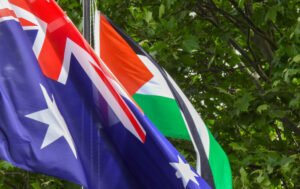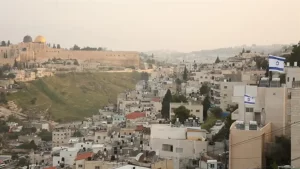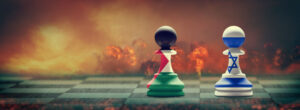
The separation wall, 2014. Photo: author.
As a response to the Amnesty International Report I am not going to argue about the facts of apartheid as a way to describe the Occupation of the West Bank, East Jerusalem, and in part, the encircling of Gaza since 1967. There has been a long-standing consensus on the left, including non-, post- and anti-Zionists that this is the case: there is a control regime over Palestinians in those areas that is a form of apartheid.
The Zionist right, and most Zionist liberals will of course always oppose such a description of the situation in the West Bank and Jerusalem, and excuse it on security grounds or Palestinian intractably or the eternal right of Jews to live anywhere but after more than half a century of separate and unequal development, ethnic cleansing, state and settler goon violence. What I want to write about is the applicability of the term apartheid to Israel within the Green Line today, and significantly, what is meant when we use the term apartheid.
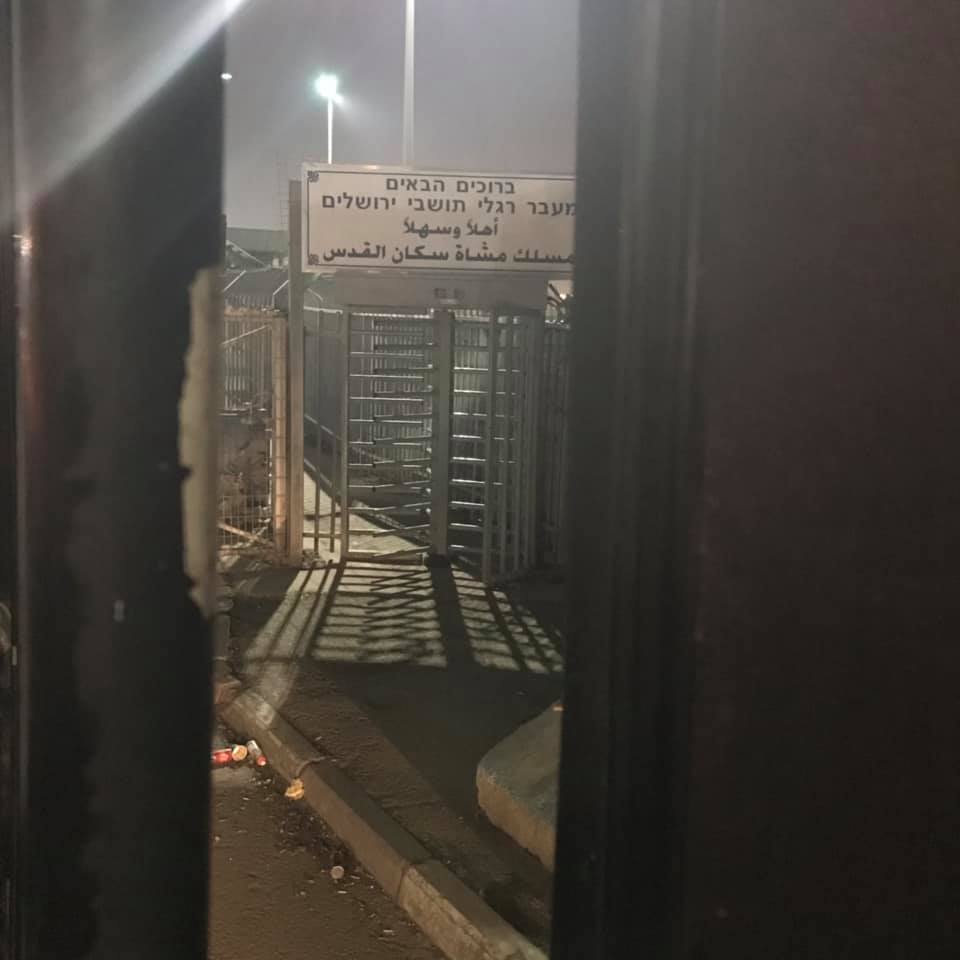
I am also not going to summarize the pros and cons of the Amnesty International report or pick over details or wild accusations of antisemitism. I can only endorse what Israeli NGOs (of course vilified by the Zionist right) have said in response to the criticism of Amnesty International: based on their long-standing, on the ground experience, the term apartheid now applies to include Israel inside the Green Line, not just the Occupied Territories.
Adalah, Breaking the Silence, B’Tselem, Combatants for Peace, Gisha, HaMoked: Centerfor the Defense of the Individual, Haqel: In Defence of Human Rights, Human Rights Defenders Fund, Ofek: The Israeli Center for Public Affairs, Parents Against Child Detention, Physicians for Human Rights Israel, The Public Committee Against Torture InIsrael and Yesh Din have collectively published this:
“Through our work, we document, verify and confront the ongoing injustice, inequality and violations of human rights and international law that Israel perpetrates against the Palestinians. Many of us have used the term and/or have made the legal designation of ‘apartheid’ in relation to various aspects of Israel’s treatment of Palestinians. The debate around the crime of apartheid of which Israel is accused, and its geographical scope, is not only legitimate, but absolutely necessary.“
In February 2010, I wrote an opinion piece for the old Galusaustralis website. I called the piece ‘A most unpleasant word’, referring to the use of the term apartheid being used by people like Shulamit Aloni, Naomi Chazan, well known as left parliamentarians in Israel with reference to the system of deliberate separation and inequality that was emerging in Israel. They also supported a selective boycott of settler products (something that the Israeli left had been doing for years).
I also quote my own words at the time “ I distinguish between my position and that of people, including some on the left, and Palestinian nationalists who take an uncompromising ‘Israel be damned position’ and condemn Israel as an inherently exclusionary, racist state, while ignoring the racism and religious intolerance that pervades other countries in the region. I do not ignore the racism and religious intolerance in the region, but nonetheless focus on Israel because that’s my connection, and I don’t expect the other countries to be democracies.” So if I am writing about Israel, don’t expect me to write about or China and its appalling treatment of the Uighur. And China isn’t a democracy.
I copped a lot of flack for the article in 2010 which basically said that if Israel kept behaving like this the term was well deserved, but I had noted that at that time, the word was already in Israeli currency. I also remember that in the early 1980s, the term Hebrew term hafradah ‘separation’ was also in circulation as well as ‘transfer’ (used in Hebrew).
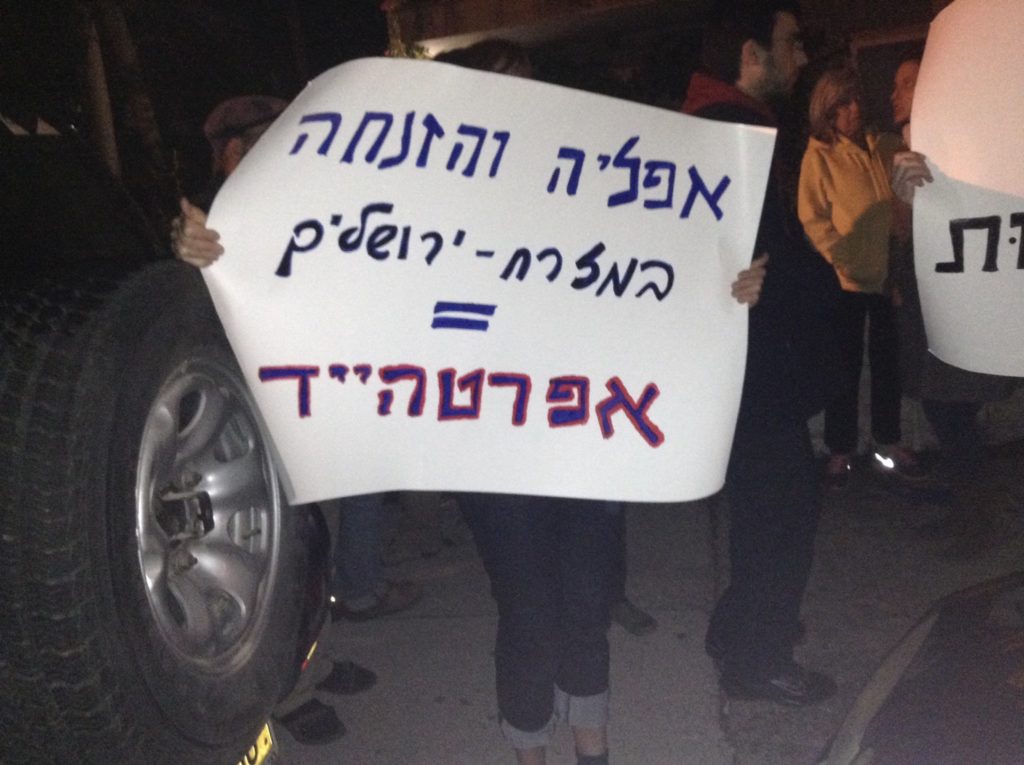
In terms of my own awareness of the meaning of apartheid, by 2010 I had been spending a fair amount of time in South Africa for sociological research purposes, mixing with both black people in informal settlements, the black middle class, and whites (predominantly Afrikaners, some of whom are still dear friends). I also met some Jews who had been active in the anti-apartheid era. I learned a lot about the impacts of structural racism in the past, and its continuance. I also learned a lot comparing the two societies from talking to, and reading many articles by the Israeli-South African academic Ran Greenstein and it was painful for me to hear him use the word apartheid so freely. I think his pieces in the US journal Monthly Review, followed up by other work are seminal because they shy away from deterministic, one-size-fits-all ideology. But still, I was reluctant to use the word apartheid to describe the situation inside the 1967 boundaries. It still appeared to be too traumatic a term for me, though it appeared very appropriate to the Territories.
In his work, Greenstein made it clear that apartheid should not be simply identified with a South African template. This is fault by people on both the left and right. Israel is NOT South Africa, but at the same time, even though it is not the same as South Africa, it has institutionalized separation. Apartheid is an abstract term, taken from Afrikaans, but now used to describe an institutional system of separation based on race or ethnicity. Indeed, the argument that old South Africa and Israel are not the same is used to deflect criticism, but that is fallacious when in fact, Israel has its own special form of apartheid.
The UN International Apartheid Convention of 1958, while defining apartheid as similar to what was occurring in South Africa at the time, also made it clear that it apartheid was not exclusively so. Thus apartheid was “inhuman acts committed for the purpose of establishing and maintaining domination by one racial group of persons over any other racial group of persons and systematically oppressing them”. Now one could play lawyer’s games over the use of the term ‘racial’ in the Convention, but the term is commonly used to refer to racial/skin colour as well as ethnic or religious origin. As John Dugard, an international lawyer notes, ‘apartheid’ was also used in other UN conventions without reference to South Africa.
The term apartheid could just as well be used, for example, to describe the situation Australia in the past (with various laws and permissions to live or work, marry, even have residence, as well as the policy of forced removal and assimilation). Likewise, the US, particularly in the South in the past, lived under what were called Jim Crow laws, most famously with segregation on buses and all sorts of public places. And structurally, ‘Negroes’ were more or less prohibited from access to all sorts of job and institutional opportunities, including progress in the US military until this was broken by Eisenhower. The same analogy about institutionalized separation can be made about Northern Ireland, where the Protestant descendants of colonizers would not have a bar of Catholic equality. In each case, we can say that each suffered from a special type of apartheid.
Most significantly, and usefully, Greenstein spoke of apartheid of a special type in Israel which need not resemble South Africa, but reflected a certain form of social practice. He applied it to both Israel within the Green Line and the Occupied Territories.
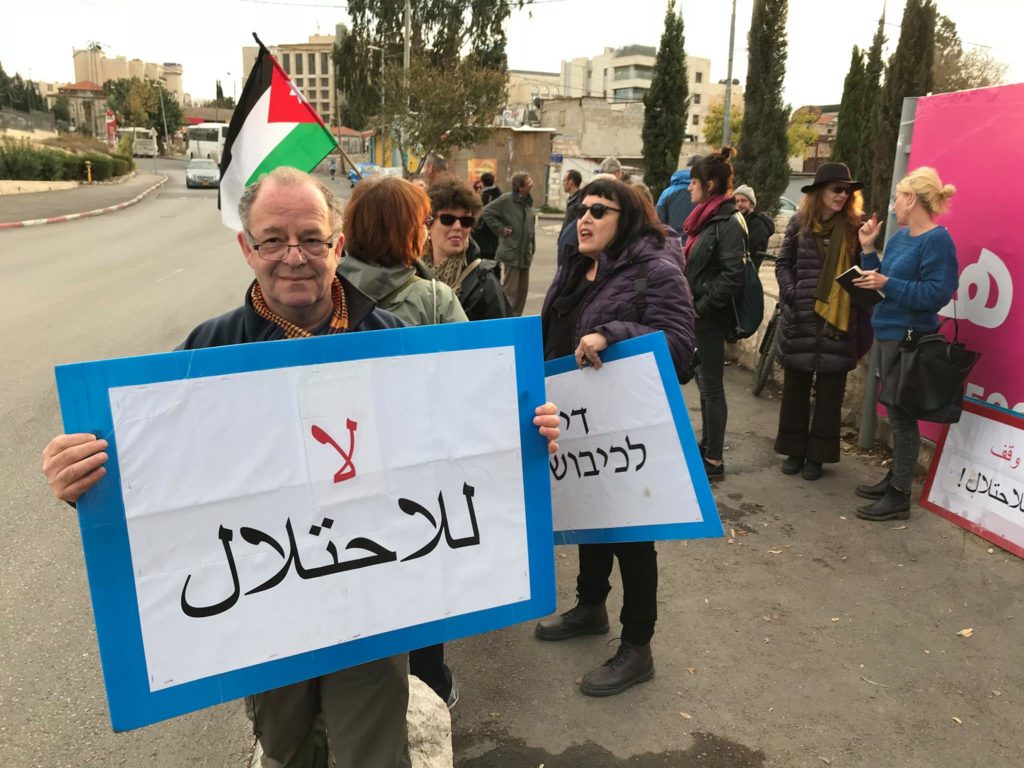
Thus, get to apartheid of a special type within Israel and why we should use the term. Being upset or shocked by its application to a state founded in trauma isn’t an excuse anymore. The archival record now clearly reveals that at a political level, Ben Gurion and others wanted a separate and unequal state from the very beginning. They may have been opportunistic, though separation was not always first and foremost in their minds, but the collapse of Palestinian society, a control regime was put into place, even if there were furious closed-door arguments about what that meant for the future.
Other Labour Zionists were complicit, not just Zionists on the right (see the review of Tom Segev’s book on Ben Gurion). It is now even clear that this way of thinking had been going during mandate years as well – at least to get rid of or transfer out Palestinians. Others claim that it’s been inherent in Zionism from the beginning as part of its colonizing strategy. Of course, the majority of ordinary Ashkenazim – our great and great grandparents, or even great-great grandparents leaving Europe for Palestine in the years before WWII, probably thought absolutely nothing about the presence of Palestinians and that some Zionists though of removing them. That at least is part of my family history of migration from Poland to early Tel Aviv in early 1920s. My great grand-father had a solar topee.
In that respect, there were like other colonizers going to Australia, Kenya, South Africa. The ‘natives’ were irrelevant, at best, a hindrance to the chance to live a better life. However, we need to distinguish between the likely political innocence of many people – those who put money into the Blue Box thinking of benign and in fact uplifting outcomes- and the machinations of the political elite in Israel.
The facts of policy that resulted in ethnic cleansing are so disturbing that people just don’t want to even admit their possibility or let them enter into the conversation and this explains the vociferous response that is covered by crude calls of ‘antisemitism’. Cold history shreds the ideals of benign liberal Zionism which somehow thinks it can accommodate a form of land of Israel with a gentler form of colonialism (though never call it that). Furthermore, even if one admits the possibility that the historical record is right and there was a policy of exclusion and expulsion, justifications still are provided for the separation of peoples. This is the position taken by Benny Morris who conducted fundamental work on the extent of the Naqba. He now argues that it, and the policy of control over the remaining population is politically was justified for two reasons. First, the total trauma of the Jewish community in the face of the holocaust where saving Jewish lives were prioritized during Israel’s wars, obviously including 1948 (and rescuing Jews from the disastrous situation in Arab lands). Second, that Israel was under siege from hostile neighbours and more or less continues to be in such a condition, particularly form Palestinians under its control. Such an argument admits that yes, the Yishuv and Israel made mistakes, but, the in the end, they have been justified. In less brutal terms, that’s an argument for the status quo – Israeli is not perfect, and the situation is complex, and is one that is repeated, with various levels of hyperbole by supporters of the ‘this is not apartheid’ situation. This is even though Palestinians have argued for decades that they have the truth of oral testimony of the Naqba and the period after that (the research by Nahla Abdo and Nur Masalha for example) , but this has always been discredited by the Israeli mainstream. However, the allegations about the massacre at Tantura are confirmed now despite a scandalous treatment of a Master’s student decades ago.
Thus a whole host of nationalized practices, including limitations on land purchase, institutionalized racist housing policies, and consistently low budges given to municipalities and schools, and most famously now the Nation State Law, as well as the second-ranked status of Arabic as a national language, institutionalize at least 20% of Israelis into a second class state of citizenship, with a host of accompanying law and practices to keep them in their place. Sadly, exclusivity and blatantly racist religious nationalism, once confined to a recognizable minority, appears to have gone mainstream.
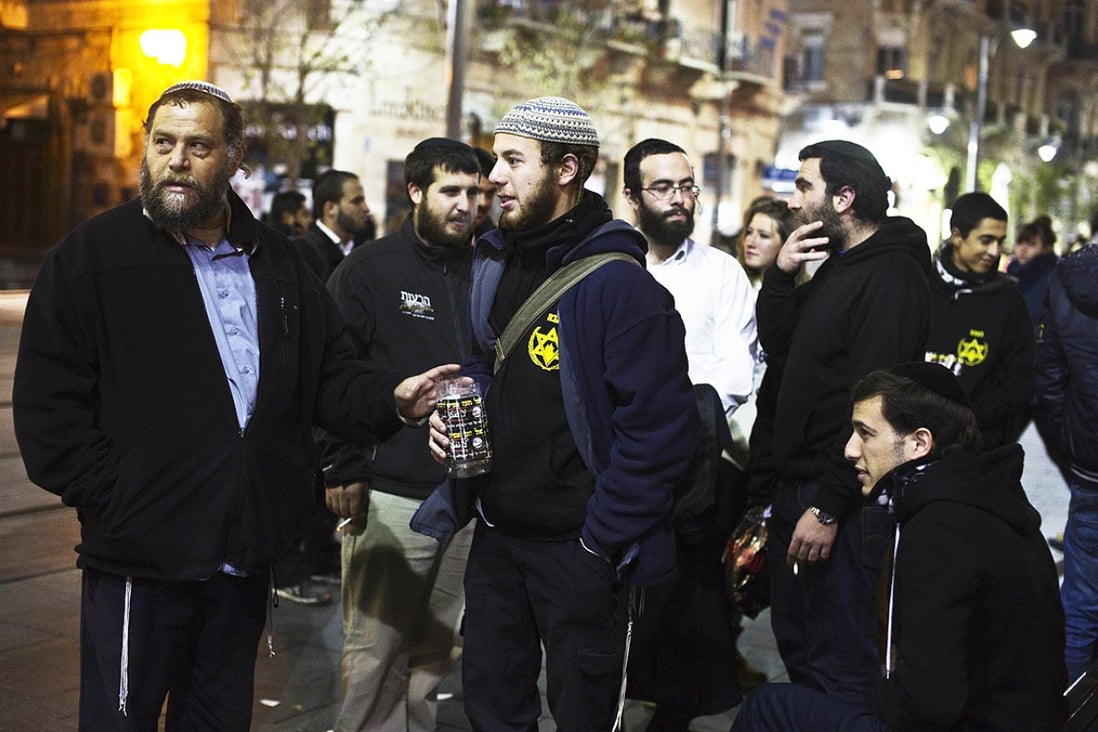
It is not just a matter of what the Israeli research or the archives tell us. The colonized have every right to be heard and respected. Noura Mansour, born in Akko, an Israeli citizen now in Australia, wrote in the Canberra Times on 5 February 2022, about her wedding in Akko – where many people – including her husband – could not attend.
“ My husband wasn’t there. I got married alone…..The reason for this absurd situation is that both my husband and I are not Jewish. I am a Palestinian citizen of Israel, and even though my family tree can be traced back to 1266, Israel treats me like a second-class citizen, because my mere existence in my homeland is considered a “demographic threat”. And while, Jewish Israelis have an easy pathway for spousal visas, Palestinian citizens of Israel don’t…Denying the right to family reunification is one of many forms of abuse Israel inflicts on the Palestinian people.”
Now, the argument is made by those who want us to think the status quo is fine that this is an exception to the rule. There may be security concerns that prevent family reunification that can’t be revealed. More generally, despite their minority status, there are Palestinian Israeli members of the judiciary (including the High Court), and increasing and important numbers of Palestinians in the professions, particularly health, in academia, and in the IT industry. They can also vote, even for Islamist parties. Compare this to other countries! Their standard of living is higher than that in neighbouring countries. There are even members of the diplomatic corps, and on it goes. Others will take the position: yes, there are real problems but to call it apartheid-akin to South Africa- is exaggerated and offensive.
But as I have suggested, the apartheid argument is not about resemblance to South Africa, more that it is about an institutionalized and pervasive discrimination in both law and practice to create separate and unequal societies, and this is now the case in Israel proper. There may be formal democracy with some representation, and exceptions in the political, judicial and other spheres, but the system is rigged against Palestinians.
Consider the case the case for someone like Ibtisam Mara’ana the Palestinian Israeli Knesset member and media star. Despite her decision to be inside the system, she is very clear about her outsider status and the general ill will towards her community. As she argued in her first and highly moving Knesset speech, which is fortunately subtitled after the first minute) , Palestinians are traumatized and continue to live with the effects of the Nabka and this is manifested in some of the dysfunction in Palestinian communities, but as much, and even more so, because of institutionalized discrimination. Her sister died because of inadequate medical care.
As I wrote in 2010, if you believe in Israel at all costs; not as a country with human rights and an effective democracy, but rather one based on exclusivism, religious imperatives, nationalism, and an iron fist; then you have to accept what is happening for what it is commonly known as apartheid and be prepared to live with it.
Now, if you don’t agree with apartheid in Israel or the Occupied Territories, it should be called out. This is not demonizing the country as Zionist propagandists claim, at least for those who care about the country as distinct from those who have a demonizing agenda. Calling out Israeli is about Israeli politics and state evil, in the same way that we call out the Australian government for its attitude to refugees, or how people continue to protest for civil rights in the US. And of course, this doesn’t put the Palestinian authority or Hamas off the hook for their abuses of the population as documented by Human Rights Watch, but their sins cannot be used to deflect criticism of the power in control – Israel.
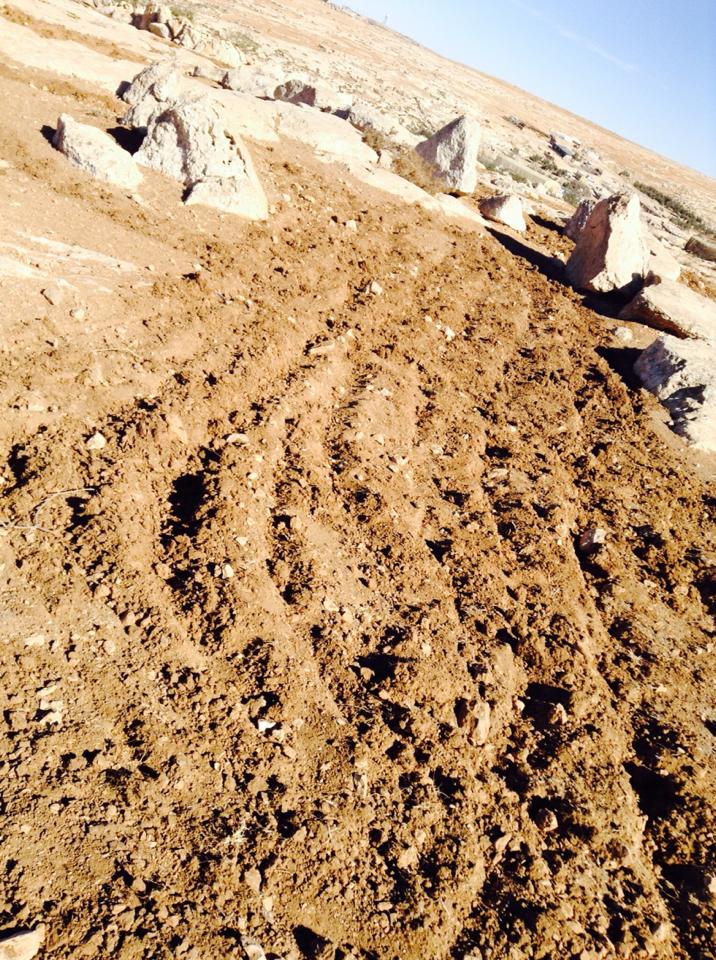
As with South Africa or Northern Ireland, admission of the truth isn’t the end of the world, nor is it disloyal. There are ways forward or Israel and Palestine though that path is unclear as we all know, and it will take massive international support and encouragement which is sadly lacking at the moment. I can’t be prescriptive about what form this should be but I put a possibly real question to readers. Nor do I recommend taking often abstruse post-colonial and intersectional ideas which really belong in the seminar room as a guide to political strategy, though this appears to be the fashion at the moment. These ideas, resembling old time structuralism and the work of Althusser, are far too determinist and crude for my way of thinking. What is really needed is some long-term talk in new civic spaces with people from both communities to get out of this mess. This means the anti-normalization stances which exist on both sides of the divide need to be abandoned.
So I put the matter in a much more simple fashion. Would you accept a political solution with a Palestinian Prime Minister of a state for all its peoples, someone like Ibtisam Mara’ana? If you cannot countenance a Palestinian Prime Minister or President, then you can’t countenance equality. Likewise, would Palestinians be prepared to have someone like Merav Michaeli as Prime Minister of a new political arrangement? If you can’t, then you don’t countenance equality. Israeli Jews and their culture are there now. Are you prepared to sit in the same room and work towards a new future? I raise this because the realization that that two sides were part of the solution, despite massive inequalities between the two, was a key to the end of apartheid. Afrikaner Broderbond nationalists sat down with the ANC. Read Endgame: Secret Talks and the End of Apartheid by Willie Esterhuyse just to see what can be done.
The solution, whatever state or states solution emerges, has to be based on shared human rights principles that equally apply to Palestinians and Israeli Jews, ones that stay clear of ethnic/religious exclusivity in a shared territory. I don’t care if people care themselves Zionists or Fatah members – but what I do care about is that they do no harm to the other. Maxime Rodinson, the French scholar of the Middle East who wrote one of the first books on Israel as a colonial state noted that there is no revolutionary solution to the problem. After being involved in one way or other with Israel and Palestinians since the 1970s I agree.
version 1.0. I may tinker.
